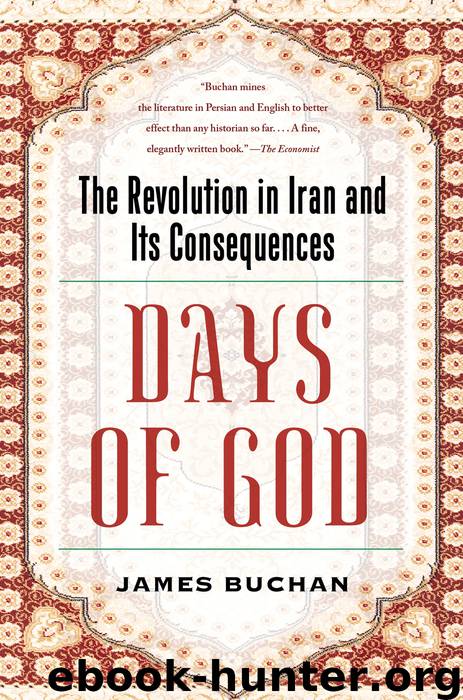Days of God : The Revolution in Iran and Its Consequences (9781416597827) by Buchan James

Author:Buchan, James
Language: eng
Format: epub
Publisher: Simon & Schuster
CHAPTER 11
God Is Great
If God’s Prophet were here now, He’d say, “Why did you give My son three hosannas, and Me only one?”
—Mehdi Bazargan1
On the television in Gharabaghi’s office at the Supreme Commander’s Staff compound in North Tehran, the Iranian and U.S. officers watched Mohammed Reza depart. One officer laid his head on General Huyser’s shoulder and wept. Admiral Habibollahi, the commander of the navy, attempted a locker-room suavity: “When rape is inevitable, relax and enjoy it.”2
There was talk of seizing power, that very night, at 2:30 a.m., but Huyser brought the officers down to earth. He knew the staff had made no preparations, nor identified the installations—such as the television station and power plants—to be occupied. The forces were short of winter clothes and depended on diesel and motor gasoline brought in from Saudi Arabia in converted C-130 transports. “Do you fully realize we do not have the planning to the point where we could achieve success?” Huyser asked. Gharabaghi, who had returned from the airport encouraged by the conduct of the Imperial Guard, astonished Huyser by saying: “The Shah told us to trust you, to listen to you, to obey you.”3 After seven and a half hours, the group broke up.
For Huyser, the Iranian General Staff had come through the ordeal. The officers had not left en masse for Mehrabad and scrambled onto Mohammed Reza’s aircraft. Always more sanguine than Ambassador Sullivan, Huyser believed the Iranian armed forces could retain their cohesion in support of the Bakhtiar government. After nearly a year on the streets, exposed to insults, threats, and bouquets thrust down their rifle muzzles, and restricted in how they could retaliate, the ground army under General Abdol Ali Badrei was troubled and introspective. Yet Huyser believed that desertions of perhaps 100 per day were manageable in a force of 480,000, three quarters of them professionals.4 Anyway, he thought a coup would require scarcely more than 20,000 men, who could be supplied by the Imperial Guard.
In contrast, Sullivan believed that the army should simply step aside, and the two envoys, as they sat each night back-to-back in the secure communications room at the U.S. Embassy, were speaking to Washington at cross-purposes. (When Huyser reported their differences in person to the president at the White House on February 5, Carter was furious at their disunity. “The President looked as grimly angry as I had ever seen him,” noted Gary Sick of the National Security Council staff.)5 By then, the U.S. Embassy was writing that Khomeini’s movement was “better organized, enlightened and able to resist communism than its detractors lead us to believe.”
In support of what was known in Washington as “Plan B,” Huyser had urged the staff to devise a maneuver for troops to take over the food supply, water, power, and communications, and the oil fields. Iranian currency was printed in the United Kingdom and used to pay the troops. To test the mettle of the senior officers, and to stiffen their morale, Huyser had proposed two exercises.
Download
This site does not store any files on its server. We only index and link to content provided by other sites. Please contact the content providers to delete copyright contents if any and email us, we'll remove relevant links or contents immediately.
| Arms Control | Diplomacy |
| Security | Trades & Tariffs |
| Treaties | African |
| Asian | Australian & Oceanian |
| Canadian | Caribbean & Latin American |
| European | Middle Eastern |
| Russian & Former Soviet Union |
The Secret History by Donna Tartt(16684)
The Social Justice Warrior Handbook by Lisa De Pasquale(11499)
Thirteen Reasons Why by Jay Asher(7814)
This Is How You Lose Her by Junot Diaz(5808)
Weapons of Math Destruction by Cathy O'Neil(5061)
Zero to One by Peter Thiel(4841)
The Myth of the Strong Leader by Archie Brown(4798)
Promise Me, Dad by Joe Biden(4463)
Beartown by Fredrik Backman(4448)
How Democracies Die by Steven Levitsky & Daniel Ziblatt(4434)
Stone's Rules by Roger Stone(4427)
The Fire Next Time by James Baldwin(4357)
100 Deadly Skills by Clint Emerson(4095)
A Higher Loyalty: Truth, Lies, and Leadership by James Comey(4046)
Rise and Kill First by Ronen Bergman(4029)
The David Icke Guide to the Global Conspiracy (and how to end it) by David Icke(3900)
The Farm by Tom Rob Smith(3884)
Secrecy World by Jake Bernstein(3794)
The Doomsday Machine by Daniel Ellsberg(3743)
